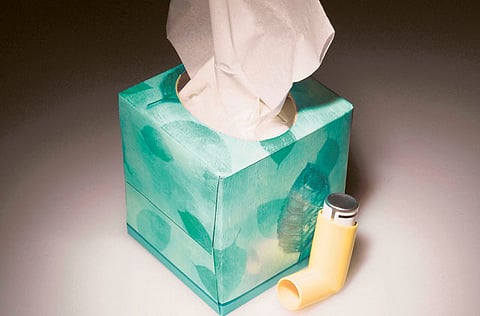Breathe easy
Increased awareness of clean air indoors and outdoors is the first step towards controlling respiratory diseases in the UAE

Summers in the Middle East are notorious not only for their severity but also for their role in increasing allergies and breathing related illnesses. According to health experts, we are in peak allergy season where, between April and June, mould spores, pollen and dust mite allergens in the air trigger a host of allergies and asthma attacks in children and adults alike. The World Health Organisation marked May 3 as World Asthma Day 2011 and the Global Initiative for Asthma (GINA) organised the themed event "You can control your asthma" in the UAE. According to the WHO, the residents of the UAE suffer a disproportionately higher rate of asthma and breathing allergies because of our hot, humid and dusty climate, rapid industrialisation and increase in planted greenery.
The reasons
When asked why people in the UAE suffer from coughs, colds, sneezing, watery eyes and nasal congestion more than their counterparts in other world regions, Dr Bassam Mahboub, head of the respiratory departments of Dubai Hospital and Rashid Hospital, said: "Pollution, sandstorms, dusty environment and more planted gardens in the cities increase our allergies. We have found more patients allergic to pollen in Al Ain than those in coastal cities such as Dubai and Abu Dhabi, where dust mites are the most common allergens due to high humidity in these regions."
Based on reports of a sharp rise in breathing-related allergies, one in five children in the UAE suffers from asthma, while 40 per cent are prone to allergic rhinitis.
Symptoms usually include a stuffy or runny nose for more than two weeks at a time.
Dr Mahboub added: "Studies show asthma prevalence to be around 13-14.5 per cent in all age groups and allergic rhinitis (stuffy, runny, itchy or blocked nose for more than two weeks after a common cold or without it) to be around 20-30.5 per cent, which puts us in the middle to higher range of prevalence to the rest of the world. Some ways to treat allergic rhinitis are to avoid triggers such as dust and pollen, maybe even try to remove them completely from the patient's environment. These changes should be made first and only then should the patient begin a course of medication such as antihistamine and inhaled steroids or immunotherapy."
The need to know
"Asthma and allergies are still under-diagnosed and under-treated. There is a need for increased awareness in the medical community and among the public as well," said Dr Mahboub when asked to explain how 52 per cent of children suffering from asthma continued to miss school in the preceding year.
Clean air is vital to the development of a child's immune system. Environmental factors such as airborne allergens can affect a baby's health as early as when it's in the mother's womb. Leading European and US studies have demonstrated the link between exposure to particulate matter during pregnancy and low birth weight.
Children are also more likely to develop allergies if one or both parents have allergies and/or asthma. UAE research shows that younger children, girls and people of Arab origin are at greater risk of developing allergies.
So it's vital to create awareness on the issue of good air quality, indoors and outdoors.
— Andrea Bailey is a UAE-based freelance writer
Sign up for the Daily Briefing
Get the latest news and updates straight to your inbox



